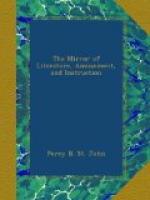TOM HOPKINS.
At the time of which I speak, Tom Hopkins was of an age somewhat equivocal; public fame called him fifty, whilst he himself stuck obstinately at thirty-five; of a stout active figure, rather manly than gentlemanly, and a bold, jovial visage, in excellent keeping with his person, distinguished by round, bright, stupid black eyes, an aquiline nose, a knowing smile, and a general comely vulgarity of aspect. His voice was hoarse and deep, his manner bluff and blunt, and his conversation loud and boisterous. With all these natural impediments to good company, the lowness of his origin, recent in their memories, and the flagrant fact of his residence in a country town, staring them in the face, Mr. Tom Hopkins made his way into almost every family of consideration in the neighbourhood. Sportsmanship, sheer sportsmanship, the qualification that, more than any other, commands the respect of your great English landholder, surmounted every obstacle.
With the ladies, he made his way by different qualities; in the first place he was a character, an oddity, and the audacity of his vulgarity was tolerated, where a man only half as boisterous would have been scouted; then he was gallant in his way, affected, perhaps felt, a great devotion to the sex, and they were half amused, half pleased, with the rough flattery which seemed, and probably was, so sincere.
His house was an ugly brick dwelling of his own erection, situate in the principal street of Cranley, and adorned with a green door and a brass knocker, giving entrance into a stone passage, which, there being no other way to the stable, served both for himself, and that very dear part of himself, his horses, whose dwelling was certainly by far more commodious than their master’s. His accommodations were simple enough. The dining-parlour, which might pass for his only sitting-room,—for the little dark den which he called his drawing-room was not entered three times a year; the dining-room was a small square room, coloured pea-green with a gold moulding, adorned with a series of four prints on shooting, and four on hunting, together with two or three portraits of eminent racers, riders, hunters, and grooms. Guns and fishing-rods were suspended over the mantelpiece; powder-horns, shot-belts, and game-bags scattered about; a choice collection of flies for angling lay in one corner, whips and bridles in another, and a pile of books and papers,—Colonel Thornton’s Tour, Daniel’s Rural Sports, and a heap of Racing Calendars, occupied a third; Ponto and Carlo lay basking on the hearth-rug, and a famous little cocking spaniel, Flora by name, a conscious favourite, was generally stretched in state on an arm-chair.
Here, except when the owner was absent on a sporting expedition, which, between fishing, shooting, hunting, and racing, did, it must be confessed, happen pretty often; here his friends were sure to find a hearty welcome, a good beef-steak,—his old housekeeper was famous for cookery!—and as much excellent Port and super-excellent Madeira—Tom, like most of his school, eschewed claret and other thin potations—as their host could prevail on them to swallow. Many a good fellow hath heard the chimes at midnight in this little room.




